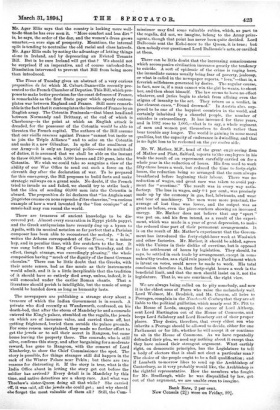Mr. W. Mather, M.P., head of the great engireering firm
of Mather and Platt, Salford, reports to:the employers in his trade the result of an experiment carefully carried on for a whole year in the reduction of hours. His firm used to work fifty-three hours a week, but reduced the time to forty-eight hours, the reduction being so arranged that the men always breakfasted before beginning their labour. There was no reduction of wages, and great care was taken to avoid pay- ment for " overtime." The result was in every way satis- factory. The loss in wages, only 0.4 per cent., was precisely made up by the economy in gas, fuel, lubricants, and wear and tear of machinery. The men were more punctual, the average of lost time was lower, and the output was as great as before, even the piece-workers showing an increased energy. Mr. Mather does not believe that any "spurt" was put on, and his firm intend, as a result of the experi- ment, which was made in a year of great depression, to make the reduced time part of their permanent arrangements. It is on the result of Mr. Mather's experiment that the Govern- ment has introduced the forty-eight-hour week at Woolwich and other factories. Mr. Mather, it should be added, agrees with the Unions in their dislike of overtime, but is opposed to the settlement of hours by legislation. They should, be says, be settled in each trade by arrangement, except in some unhealthy trades, as a rigid rule passed by a Parliament which is intent on votes, could never be made to work. His total conclusion therefore is, that forty-eight hours a week is the beneficial limit, and that the men should insist on it, not the legislature. That is, we are convinced, the right view.


































 Previous page
Previous page